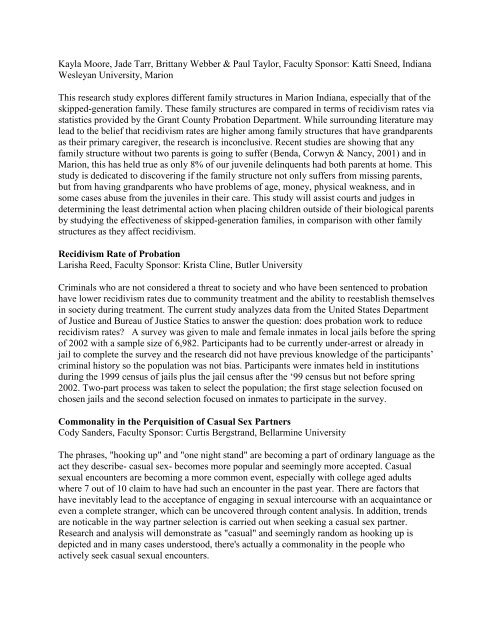Anthropology - Butler University
Anthropology - Butler University
Anthropology - Butler University
Create successful ePaper yourself
Turn your PDF publications into a flip-book with our unique Google optimized e-Paper software.
Kayla Moore, Jade Tarr, Brittany Webber & Paul Taylor, Faculty Sponsor: Katti Sneed, Indiana<br />
Wesleyan <strong>University</strong>, Marion<br />
This research study explores different family structures in Marion Indiana, especially that of the<br />
skipped-generation family. These family structures are compared in terms of recidivism rates via<br />
statistics provided by the Grant County Probation Department. While surrounding literature may<br />
lead to the belief that recidivism rates are higher among family structures that have grandparents<br />
as their primary caregiver, the research is inconclusive. Recent studies are showing that any<br />
family structure without two parents is going to suffer (Benda, Corwyn & Nancy, 2001) and in<br />
Marion, this has held true as only 8% of our juvenile delinquents had both parents at home. This<br />
study is dedicated to discovering if the family structure not only suffers from missing parents,<br />
but from having grandparents who have problems of age, money, physical weakness, and in<br />
some cases abuse from the juveniles in their care. This study will assist courts and judges in<br />
determining the least detrimental action when placing children outside of their biological parents<br />
by studying the effectiveness of skipped-generation families, in comparison with other family<br />
structures as they affect recidivism.<br />
Recidivism Rate of Probation<br />
Larisha Reed, Faculty Sponsor: Krista Cline, <strong>Butler</strong> <strong>University</strong><br />
Criminals who are not considered a threat to society and who have been sentenced to probation<br />
have lower recidivism rates due to community treatment and the ability to reestablish themselves<br />
in society during treatment. The current study analyzes data from the United States Department<br />
of Justice and Bureau of Justice Statics to answer the question: does probation work to reduce<br />
recidivism rates? A survey was given to male and female inmates in local jails before the spring<br />
of 2002 with a sample size of 6,982. Participants had to be currently under-arrest or already in<br />
jail to complete the survey and the research did not have previous knowledge of the participants’<br />
criminal history so the population was not bias. Participants were inmates held in institutions<br />
during the 1999 census of jails plus the jail census after the ‘99 census but not before spring<br />
2002. Two-part process was taken to select the population; the first stage selection focused on<br />
chosen jails and the second selection focused on inmates to participate in the survey.<br />
Commonality in the Perquisition of Casual Sex Partners<br />
Cody Sanders, Faculty Sponsor: Curtis Bergstrand, Bellarmine <strong>University</strong><br />
The phrases, "hooking up" and "one night stand" are becoming a part of ordinary language as the<br />
act they describe- casual sex- becomes more popular and seemingly more accepted. Casual<br />
sexual encounters are becoming a more common event, especially with college aged adults<br />
where 7 out of 10 claim to have had such an encounter in the past year. There are factors that<br />
have inevitably lead to the acceptance of engaging in sexual intercourse with an acquaintance or<br />
even a complete stranger, which can be uncovered through content analysis. In addition, trends<br />
are noticable in the way partner selection is carried out when seeking a casual sex partner.<br />
Research and analysis will demonstrate as "casual" and seemingly random as hooking up is<br />
depicted and in many cases understood, there's actually a commonality in the people who<br />
actively seek casual sexual encounters.
















